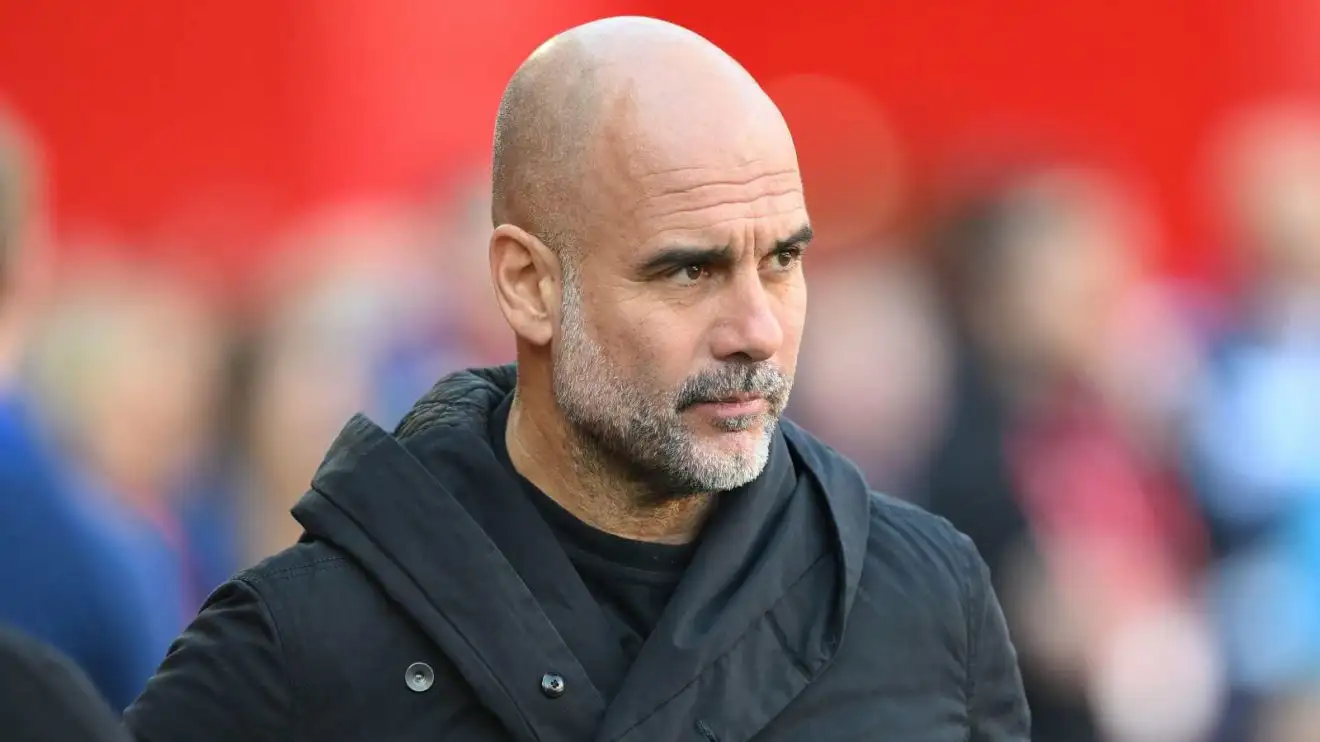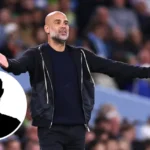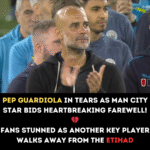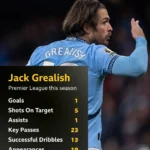Man City Star He’s now expected to wave goodbye to Man City in the coming weeks

When Jack Grealish stepped onto the pristine training pitches of Manchester City’s academy in the summer of 2021, his words echoed with the unbridled enthusiasm of a player who had finally reached the summit of English football. “It’s a dream come true to be part of this club,” he declared in his first interview, his Birmingham accent carrying the weight of expectation that comes with being the most expensive British player in history.
The £100 million transfer fee that prised him away from Aston Villa represented more than just a financial transaction; it was a statement of intent from a club that had grown accustomed to acquiring the finest talents in world football. For Grealish, it was validation of a journey that had taken him from the youth ranks of Villa Park to the pinnacle of European football, where Champions League nights and Premier League titles were the norm rather than the exception.
Yet, as the 29-year-old midfielder now contemplates his future away from the Etihad Stadium, the narrative has shifted dramatically. What began as a fairy tale has descended into a cautionary tale about the unforgiving nature of elite football, where past glories count for little and present form determines everything. The player who once danced through defenses with the ball seemingly glued to his feet has found himself on the periphery of Pep Guardiola’s grand vision, a marginal figure in a squad that once viewed him as central to their ambitions.
The Golden Period: Treble Success and Individual Brilliance
To understand the magnitude of Grealish’s fall from grace, one must first appreciate the heights he scaled during his time at City. His second season at the club, the 2022-23 campaign, stands as a testament to his quality and adaptability. While his debut season had been marked by adjustment and occasional flashes of brilliance, it was in his sophomore year that Grealish truly found his rhythm in Guardiola’s intricate system.
The Treble-winning season saw Grealish evolve from a luxury player into an integral component of City’s machine. His ability to retain possession, create space for teammates, and provide that crucial spark in tight games made him invaluable during the most successful period in the club’s history. When City lifted the Champions League trophy in Istanbul, defeating Inter Milan 1-0 in the final, Grealish’s contribution throughout the campaign had been significant, even if it didn’t always translate into eye-catching statistics.
During that golden period, Grealish showcased the tactical intelligence that had convinced Guardiola to sanction such a substantial investment. His positional awareness, work rate, and ability to press from the front aligned perfectly with the Catalan’s demands. More importantly, he demonstrated the mental fortitude required to thrive in high-pressure situations, contributing to victories in crucial Premier League matches and knockout rounds of European competition.
The success wasn’t merely collective; Grealish’s individual performances during the Treble campaign suggested a player who had finally found his ideal environment. His dribbling statistics remained impressive, his key passes per game increased, and his defensive contributions showed a player willing to buy into the collective ethos that defines Guardiola’s teams. For a brief, shining moment, the £100 million fee seemed entirely justified.
The Descent: Injuries, Form, and Lost Confidence
However, football’s narrative arcs rarely follow linear trajectories, and Grealish’s story took a dramatic turn over the subsequent two seasons. The 2023-24 and 2024-25 campaigns have been characterized by a series of setbacks that have gradually eroded both his standing within the squad and his confidence as a player.
Injuries played a significant role in his decline, with various muscle problems and fitness issues limiting his availability and rhythm. The stop-start nature of his appearances made it difficult for him to build momentum, and each return from injury seemed to coincide with a period of readjustment that took longer than anticipated. In modern football, where tactical systems are increasingly complex and player roles highly specialized, any extended absence can prove detrimental to a player’s integration within the team structure.
Beyond the physical setbacks, Grealish’s performances when fit began to lack the spark that had made him such a coveted asset. His decision-making appeared rushed, his trademark dribbling less effective, and his final ball often lacking the precision that separates good players from great ones. The confidence that had once allowed him to take on multiple defenders and create something from nothing seemed to evaporate, replaced by a cautious approach that was antithetical to his natural instincts.
The statistics tell a sobering story. With only 17 Premier League starts across two seasons and a mere 715 minutes of top-flight football in the 2024-25 campaign, Grealish’s involvement became increasingly peripheral. For a player accustomed to being the focal point of his team’s attacking play, this reduced role represented a significant psychological challenge. The frustration was evident in his body language during matches, and his animated celebrations when he did find the net suggested a player desperate to prove his worth.
The Guardiola Factor: Tactical Evolution and Squad Dynamics
Pep Guardiola’s relationship with Grealish has been one of the most fascinating subplots of this saga. The Spanish manager’s initial enthusiasm for the player was evident in his public comments and tactical adjustments designed to accommodate Grealish’s unique skill set. However, as City’s tactical approach evolved and new players joined the squad, Grealish’s role became increasingly undefined.
Guardiola’s tactical philosophy demands absolute precision and adherence to systematic principles. While Grealish’s creativity and unpredictability can be valuable assets, they must be channeled within the framework of the team’s collective objectives. The manager’s frustration with Grealish’s occasional deviations from tactical instructions became apparent through his substitutions and team selections, with the player often finding himself withdrawn from matches after failing to execute specific aspects of the game plan.
The emergence of other attacking options further complicated Grealish’s situation. Players like Jeremy Doku and Savinho offered different but equally compelling skill sets, while the continued excellence of established stars like Kevin De Bruyne and Bernardo Silva made competition for places even more intense. In Guardiola’s squad, form and tactical suitability determine selection, and Grealish’s recent performances have failed to meet the exacting standards required.
The signing of Tijjani Reijnders and City’s reported interest in Rayan Cherki signal a clear shift in the club’s priorities. These players represent a different profile of midfielder, one that perhaps better suits Guardiola’s current tactical preferences. The manager’s stated desire for a smaller squad next season only compounds Grealish’s predicament, as it suggests that peripheral players will be moved on to create space for those who better fit the team’s immediate needs.
The Personal Cost: International Exile and Mental Challenges
The repercussions of Grealish’s club struggles extended far beyond the confines of the Etihad Stadium. His omission from England’s Euro 2024 squad represented a professional nadir for a player who had previously been considered one of the national team’s most important attacking assets. The decision by then-manager Gareth Southgate to exclude him from the tournament roster was a stark reminder of how quickly fortunes can change in international football.
For Grealish, the international exile was particularly painful given his previous contributions to the England cause. His performances during the 2020 European Championships and 2022 World Cup had established him as a key player in the national setup, capable of providing the spark of creativity that could unlock stubborn defenses. The fact that his club form had deteriorated to such an extent that it cost him his international place represented a significant blow to his confidence and motivation.
The mental challenges associated with this period cannot be understated. Professional footballers, particularly those who have experienced significant success, often struggle to cope with sudden drops in form and status. The pressure of justifying a £100 million transfer fee, combined with the scrutiny that comes with playing for a club like Manchester City, created a perfect storm of external pressures that may have contributed to his struggles on the pitch.
Reports of difficulties off the field, while not detailed extensively in public, suggest that Grealish’s challenges extended beyond the confines of football. The intersection of professional disappointment and personal struggles is a common theme in elite sport, where the pressure to perform at the highest level can have profound psychological consequences.
The Economic Reality: Transfer Valuations and Financial Considerations
From a purely financial perspective, Grealish’s departure from City represents a significant loss for the club. The reality of modern football economics means that few players retain their value after struggling periods, and Grealish’s market worth has undoubtedly decreased substantially from the £100 million City paid for him.
Current market conditions, combined with Grealish’s age and recent form, suggest that City will likely recoup only a fraction of their initial investment. Industry analysts estimate that his current market value sits somewhere between £40-60 million, depending on the buying club’s financial position and the player’s willingness to accept a reduced salary. This represents a substantial financial hit for a club that, despite its considerable resources, must still operate within the constraints of Financial Fair Play regulations.
The wage implications are equally significant. Grealish’s contract at City reportedly includes substantial basic salary and performance-related bonuses that reflect his status as one of the club’s marquee signings. For any potential suitors, matching or even approaching these financial terms represents a considerable commitment, particularly for clubs operating with tighter budgets than City.
The structure of any potential deal will likely involve creative financial arrangements, potentially including performance-based clauses, sell-on percentages, or loan arrangements with obligations to purchase. These mechanisms allow clubs to spread the financial burden while providing City with some return on their investment, albeit significantly less than they might have hoped when they first signed the player.
Premier League Possibilities: Familiar Territories and New Challenges
Within the Premier League, several clubs have been linked with potential moves for Grealish, each offering different advantages and challenges. Tottenham Hotspur, under the guidance of their current management, could provide the kind of attacking platform that might suit Grealish’s skill set. Their qualification for the Champions League adds to the appeal, offering him the opportunity to continue competing at the highest level of European football.
Newcastle United presents another intriguing option, with their Saudi-backed ownership providing the financial resources necessary to complete such a transfer. The club’s recent progress under Eddie Howe has been impressive, and their Champions League qualification demonstrates their ambition to compete with the traditional elite. For Grealish, the opportunity to be a central figure in Newcastle’s continuing evolution could prove appealing, particularly if it means regular playing time and a return to the England squad.
Everton, despite their recent struggles, remain a club with significant history and ambition. Their financial situation is complex, but the potential for Grealish to play a leading role in their revival could be attractive. The club’s passionate fanbase and commitment to attacking football might provide the kind of environment where his creativity could flourish once again.
The possibility of a return to Aston Villa has captured the imagination of many fans and observers. Villa’s transformation under Unai Emery has been remarkable, with the club securing Champions League qualification and developing an attractive style of play that could suit Grealish’s abilities. The emotional pull of returning to his boyhood club, combined with the opportunity to be the focal point of their attacking play, makes this one of the most compelling potential destinations.
However, each of these Premier League options comes with its own set of challenges. The financial implications of signing Grealish would be substantial for any club, requiring careful consideration of wage structures and transfer budgets. Additionally, the pressure of returning to the Premier League, particularly after his struggles at City, could create additional mental hurdles for the player to overcome.
Continental Adventures: European Opportunities and Cultural Challenges
The prospect of a move to continental Europe offers Grealish the opportunity for a fresh start away from the intense scrutiny of English football. Barcelona’s initial interest, while reportedly cooled, highlighted the kind of clubs that recognize his quality despite his recent struggles. The Catalan giants’ financial difficulties make any move complicated, but their style of play and commitment to technical excellence could provide the perfect environment for Grealish to rediscover his form.
AC Milan and Napoli represent attractive options in Serie A, a league that has historically been welcoming to English players seeking to revitalize their careers. The tactical sophistication of Italian football, combined with the passionate fan cultures of these clubs, could provide the kind of environment where Grealish’s creativity might flourish. The reduced physical intensity compared to the Premier League might also help him maintain fitness and form throughout a season.
Borussia Dortmund offers a different kind of opportunity, with their reputation for developing and revitalizing players making them an attractive destination. The club’s commitment to attacking football and their track record of helping players reach their potential could be exactly what Grealish needs at this stage of his career. The Bundesliga’s tactical approach and the club’s supportive environment might provide the confidence boost he requires.
Inter Milan, fresh from their recent successes, could offer the perfect blend of tactical sophistication and competitive ambition. The club’s ability to integrate different playing styles and their recent European pedigree make them an intriguing option for a player looking to prove himself at the highest level once again.
The cultural adjustment required for any continental move should not be underestimated. Language barriers, different tactical approaches, and new team dynamics all present challenges that must be navigated successfully. However, for a player in Grealish’s position, these challenges might be outweighed by the opportunity for a fresh start and the chance to rediscover his love for the game.
The Saudi Alternative: Financial Incentives and Career Implications
The possibility of a move to Saudi Arabia represents the most controversial potential destination for Grealish. The Saudi Pro League’s significant financial resources and aggressive recruitment strategy have already attracted several high-profile players, including Ivan Toney, who has successfully managed to maintain his England career despite the move.
From a purely financial perspective, the Saudi option would likely offer Grealish the most lucrative contract terms available. The league’s ambitious plans and tax-free salaries make it an attractive proposition for players in the latter stages of their careers. However, at 29, Grealish is arguably still in his prime years, and such a move could be perceived as premature by both fans and critics.
The competitive implications of a Saudi move are complex. While the league has attracted several talented players and is improving in quality, it still lacks the prestige and competitive intensity of Europe’s top leagues. This could have implications for Grealish’s England career, although Toney’s recent recall suggests that national team managers are becoming more open to selecting players from the Saudi league.
The cultural and lifestyle adjustments required for a move to Saudi Arabia would be substantial. The different social norms, climate, and general living conditions represent significant changes that would need to be carefully considered. For a player who has spent his entire career in England, with brief spells in other European leagues, the adjustment could be particularly challenging.
The England Factor: International Ambitions and National Team Considerations
Throughout any consideration of Grealish’s future, his international ambitions remain a crucial factor. The appointment of Thomas Tuchel as England manager has created new possibilities and challenges for players seeking to establish themselves in the national team setup. Tuchel’s tactical preferences and his willingness to select players based on current form rather than reputation could work in Grealish’s favor if he can rediscover his best form at club level.
The competition for places in the England squad has intensified considerably, with a new generation of attacking players emerging and established stars continuing to perform at the highest level. For Grealish to force his way back into contention, he needs to demonstrate consistent form and fitness at club level, regardless of which club he chooses to join.
The timing of his next move could be crucial in relation to England’s upcoming fixtures and tournaments. A successful transition to a new club, followed by a strong start to the season, could put him back in contention for national team selection. However, the longer he remains out of form or out of the spotlight, the more difficult it becomes to justify his inclusion in a competitive England squad.
Tuchel’s history of working with creative players and his tactical flexibility could potentially benefit Grealish if he can demonstrate that he has overcome his recent struggles. The German manager’s approach to player development and his willingness to adapt his system to accommodate different playing styles might provide the kind of environment where Grealish’s talents could be utilized effectively at international level.
The Road Ahead: Realistic Expectations and Future Prospects
As Grealish contemplates his future, the reality is that his next move will likely define the trajectory of the remainder of his career. At 29, he is at an age where he still has several productive years ahead of him, but the margin for error is diminishing. The choices he makes now will determine whether he can recapture the form that made him one of English football’s most exciting talents.
The key to his revival will likely be finding the right environment where his creativity can flourish without the pressure of justifying a massive transfer fee. This might mean accepting a reduced role initially, with the understanding that consistent performances and gradual improvement will eventually lead to greater responsibility and recognition.
His experience at City, while ultimately disappointing, has provided valuable lessons about the demands of playing at the highest level. The tactical discipline required in Guardiola’s system, the physical demands of competing on multiple fronts, and the mental fortitude needed to handle pressure and scrutiny are all skills that will serve him well in his next challenge.
The support network around Grealish will be crucial in ensuring a successful transition. This includes not only the coaching staff and teammates at his new club but also his personal team of advisors, fitness coaches, and mental health professionals. The holistic approach to player development that has become increasingly common in modern football will be essential in helping him rebuild his confidence and form.
Conclusion: A New Chapter Awaits
Jack Grealish’s impending departure from Manchester City represents the end of a chapter that promised so much but ultimately delivered mixed results. The £100 million dream that began with such optimism has evolved into a more complex narrative about the challenges of modern football, the pressure of expectations, and the importance of finding the right environment for individual talents to flourish.
While his time at City cannot be deemed a complete failure – the Treble success alone ensures his place in the club’s history – it has certainly not lived up to the expectations that accompanied his record-breaking transfer. The player who once seemed destined to become one of the Premier League’s defining talents has instead become a cautionary tale about the unpredictable nature of football careers.
However, at 29, Grealish’s story is far from over. The next chapter of his career could yet prove to be his most successful and fulfilling. The combination of his natural talent, the experience gained from his challenges at City, and the motivation that comes from having something to prove creates the perfect foundation for a renaissance.
Whether that revival comes in the familiar surroundings of the Premier League, the tactical laboratories of continental Europe, or the ambitious projects of emerging football markets remains to be seen. What is certain is that Grealish possesses the talent and determination to write a more positive conclusion to his career narrative.
The football world will be watching with keen interest to see where this talented but troubled player lands next. His choice will not only shape his own future but could also influence how other players navigate similar crossroads in their careers. In an era where player power and financial considerations increasingly dominate transfer decisions, Grealish’s next move will be closely scrutinized as a potential blueprint for how to successfully resurrect a stalling career.
For now, as he prepares to leave Manchester City behind, Jack Grealish can reflect on the highs and lows of his time at the Etihad Stadium. The Treble triumph will forever remain a highlight of his career, but the struggles that followed serve as a reminder that in football, as in life, success is never guaranteed and must be earned anew with each passing season.
The dream that brought him to City may have soured, but new dreams await. The challenge now is to find the right environment where those dreams can once again become reality, where the player who once danced through defenses with such joy and creativity can rediscover the magic that made him special. The next chapter of the Jack Grealish story is about to begin, and it promises to be every bit as compelling as what has come before.















